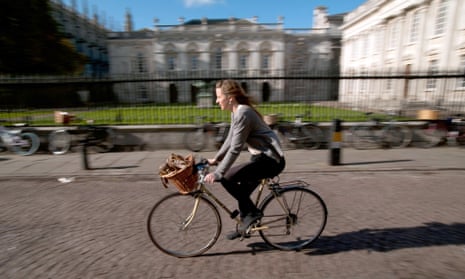The application deadlines for Oxford, Cambridge and medical school courses close in mid-October – and the interview process that follows is shrouded in mystery and nerves, for those invited to take part.
Sam Lucy, director of admissions for Cambridge colleges, talks about the interview process at Cambridge university, the pitfalls that applicants can fall into – and even what to wear.
“There is quite a lot of over-thinking about the process and trying to interpret what we’re looking for. We’re looking for people who are extremely enthusiastic about the subject they are applying for, have got the right aptitudes and, if necessary, prior knowledge for it. Everything we do in the process is about trying to identify those things.
“Are you going to be that person who turns up and has done the work and has really thought about the subject, and comes to [tutorials] and engages with us so that we can teach effectively? And that’s really all there is to it. It’s not something secret.”
How does nerves affect applicants at the interview stage?
“Often, in relation to the interview, [applicants] do get very very nervous because obviously they are placing a huge amount of weight on it, even if we are not placing so much weight.
“You find people coming along with rehearsed answers to things, so they are predicting what the questions might be and trying to learn a response – and that never, ever works. Because if we spot that being delivered to us, as trained interviewers, we tend to gently stop that answer and move on to something they haven’t thought about before.
“The thing you are trying to do at the interview is to understand how somebody is approaching a problem and how they are thinking their way through to a potential solution or a series of ideas.”
How much can candidates prepare in advance for their interview?
“If somebody is giving you something they have already prepared, it doesn’t come across well at all. I think it’s just nerves. We all do it, we’re going for a job interview, what shall I answer if somebody asks me this question, I’ll have something ready to go, and actually that’s the wrong advice.
“One of the bits of advice I give to applicants is to pretend that you are already a student and you are just turning up for a supervision.
“Just turn up ready to engage, ready to talk, happy to discuss anything that comes up in course of a conversation. So think about it as more of a teaching session and less of a job interview.”
Can interviewers tell if the candidate is giving a prepared answer?
“Yes, the tone of voice changes. There is absolutely no point in doing it. It is immediately apparent. We will just stop that particular answer, and say ‘You’ve clearly thought about that before, can I ask you something that you haven’t thought about before?’.”
Some companies offer interview preparation. Are they a waste of time?
“Absolutely.”
Should candidates worry about what they wear?
“You see people every year who are too cold. They are actually cold and shivering. It’s December, you could be waiting in a very cold corridor and come into an overheated room.
“My advice would be to dress in layers, so that you can take things on and off as you need to. Dress so that you feel comfortable. If you feel comfortable wearing a suit and tie, good for you, if you feel comfortable wearing jeans and a t-shirt, that’s absolutely fine as well.
“The funny thing about interviewing is that you don’t actually remember what people wear. I sometimes remember 20 people across the course of a day. I’m making notes about what they’ve said, I don’t make notes about what they were wearing. It’s the quality of their answers and how they are approaching a problem that you record.”
Keep up with the latest on Guardian Students: follow us on Twitter at @GdnStudents – and become a member to receive exclusive benefits and our weekly newsletter.

Comments (…)
Sign in or create your Guardian account to join the discussion